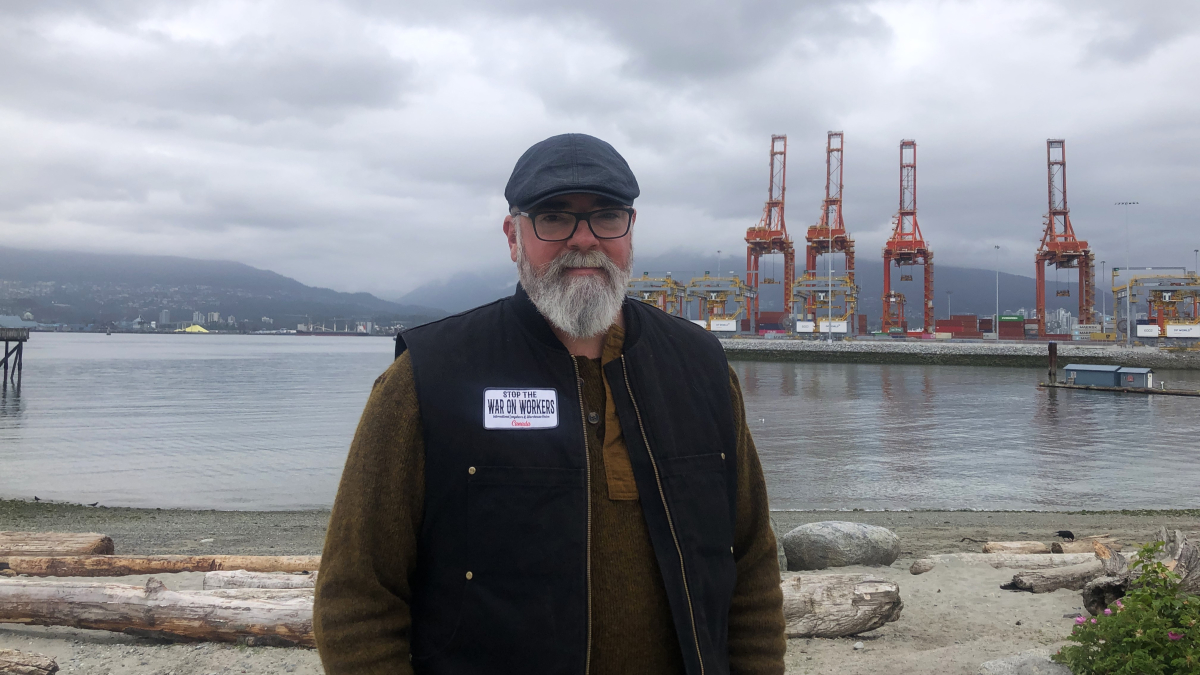Support strong Canadian climate journalism for 2025
Labour unions are joining forces with environmental organizations to oppose a massive Metro Vancouver port expansion greenlit by the federal government earlier this year.
The construction of this new structure — essentially a concrete island the size of 150 football fields — in the Fraser Estuary will not only hurt the environment, it will be a job killer, said Rob Ashton, national president of the International Longshore and Warehouse Union of Canada (ILWU), at a press conference Wednesday morning.
Movement of cargo, products and goods is the biggest job creator for the ILWU and automated shipping terminals, like the proposed port expansion, threaten the livelihoods of members, Ashton told the media as he stood against a backdrop of Vancouver Centerm Terminal.
The press conference took place at 9:30 a.m. in Crab Park, Vancouver, on June 14. Another labour union representative, DJ Pohl, who is a provincial executive member of the BC General Employees' Union, emphasized that “economic benefits must not come at the expense of jobs or the environment,” nodding to the common perception that fighting for the environment equals an attack on workers. But things are changing, she said.

“The narrative is no longer jobs versus the environment; these things go hand in hand. And they have to,” said Pohl.
The two labour leaders spoke alongside representatives from Birds Canada, the Georgia Strait Alliance, Wilderness Committee and Tsleil-Waututh Nation member Reuben George.
This marks the first public show of solidarity between opponents of the Roberts Bank Terminal 2 expansion and the union representing the workers most affected by the project.
Approved in April, the Roberts Bank Terminal 2 (RBT2) project would double the existing facility’s footprint and increase the amount of shipping traffic in the area. The approval came with 370 conditions attached to it aimed at protecting the environment and local species.
The Vancouver Fraser Port Authority, which is behind the project, says RBT2 is needed to keep up with shipping container demand and meet international trade objectives over the next 20 years. Now that the federal government has approved it, speakers are calling on the provincial government to withhold the certificate for the project under the Environmental Assessment Act.
B.C. Premier David Eby voiced his support for the expansion in late April. In May, environmental groups launched a legal challenge against the federal government’s approval of the Roberts Bank Terminal 2 expansion.
This is the first time the ILWU has joined forces with environmentalists, and it sounds like it won’t be the last. Ashton says based on his union's communication with the port authority, “all horizontal equipment will be automated.”
For those unfamiliar with shipping terminals, horizontal equipment is “just about every piece of equipment at this terminal, at any container terminal,” said Ashton. While it’s not uncommon for terminals to have some level of automation, this would be in “one fell swoop” and likely force other terminals to increase automation in order to compete with Roberts Bank, he said.
The port authority's outgoing CEO “promised me 800 jobs if I flipped and went to his side, sacrificing 2,000 to 3,000 of my people, sacrificing the environment, sacrificing the biofilm that feeds the shorebirds, sacrificing orca whales, salmon, crabs, sacrificing Indigenous way(s) of life,” said Ashton.
“We can't stand for that.”
Port expansion may be the biggest job creator, “but we don't do it at any cost,” said Ashton.
The port authority responded to the ILWU’s concerns about the project in February. In the statement, Duncan Wilson, the port authority’s vice-president of environmental and external affairs, said the union was communicating “false statements” about terminal automation and said Roberts Bank Terminal 2 “would generate tens of thousands of well-paying supply chain jobs.”
Once the project is operational, it will create more than 17,300 jobs per year and $3 billion in GDP annually, said Wilson. He also noted that the port authority does not operate terminals and that an operator will ultimately decide the “final configuration” for the terminal.
Ashton maintains that the federal government should have extended the approval process so that three other port expansion projects could be considered alongside the Roberts Bank proposal.
The ILWU is currently bargaining a new contract with the British Columbia Maritime Employers Association after its old one expired in March. One of the biggest points of tension — other than wage increases — is the automation of equipment used to move and handle cargo.
A strike vote held on June 9 and 10 showed 99 per cent are in favour of supporting strike action against the member companies of the BC Maritime Employers Association if necessary.
“We warned the federal government when they were going through the decision-making process that the approval of RBT2 was going to affect bargaining,” Ashton told reporters. “It's now what? 10 o’clock? A little bit after that ... I was supposed to be at the bargaining table at nine o'clock this morning. But here today, right now, I'm here with our allies defending our job(s), and it's affecting bargaining.”

Ashton urged people who want to stop Roberts Bank Terminal 2 to contact their provincial and federal representatives and get in touch with or join allied groups like the Georgia Strait Alliance and Wilderness Committee.
Labour and environmental speakers alike highlighted the common struggle of the worker class facing off with corporations that pad their pockets by cutting both wages and environmental corners and automating jobs.
“The working class is made up of all of us. And we'll never be divided,” said Ashton. “We may have our differences, but we'll talk about them and we'll work them out as best we can.”
Natasha Bulowski / Local Journalism Initiative / Canada’s National Observer






Comments
One compromise that may offer a well rounded alternative would be to wind down the 40%-50% of the current Robert's Bank area devoted to coal, and allow the container facility to expand into the vacated land with long term job guarantees. The coal facility likely has more automation and fewer jobs per hectare than the existing container operations.
Coal needs to disappear altogether in an increasingly intense planetary climate emergency. Yet exports and healthy economies are important too. Why the Trudeau government allows export permits for thermal coal (the worst climate busting material) from Wyoming when all other major North American West Coast ports said NO signals the role of private money in the political process, and the talent of some highly paid lobbyists.
The fact metallurgical coal is also exported from this facility does not prevent industry, governments, First Nations, labour and environmental organizations from casting aside short term thinking and discuss how to bring steel making to BC using electrometallurgy processes and renewable power, and create thousands of permanent jobs in the process to Hoover temporarily unemployed coal mining and Port personnel, with retraining and relocation covered. Ontario is already making green steel via electric arc furnaces and some carmakers are placing orders for their upcoming EVs.
We mustn't forget that Prince Rupert also has the Ridley Island coal port, which should also be subjected to the same climate policy to convert coal facilities to containers shipping Canadian manufactured goods, with net zero land expansion.
Very cool comment. Thoughtful and informative.
So I find it interesting and positive when I see labour and environmentalists teaming up.
But the automation side of it underlines for me a basic problem with capitalism. Ultimately, all else being equal, automation is in my opinion a good thing. When more gets done and it requires less work, that's good, not bad. In theory, if you spread all the hours of work equitably across all the people working, that means everyone gets to work a bit less hard. But capitalism forces workers to be, basically, against saving labour, because when capitalists save labour, workers lose jobs and end up unemployed, maybe homeless. Maybe somehow, somewhere, the increased efficiency leads to some kind of increase in economic growth--but in practice, often it doesn't, it just goes into the latest stock buyback so some gajillionaires can make a killing while the rest of us get closer and closer to the edge. And the reduced labour requirements don't lead to everyone having a shorter work week, they just divide up the still-working-just-as-hard from the sacked, who then maybe scrounge up some gigs waiting tables and driving Uber.
If you had a system where nobody loses from automation because everyone is guaranteed a decent paying job and free training, you could automate without a ton of conflict because you wouldn't be automating away jobs, you'd just be automating away work, giving everyone a bit more free time. But that would require that one way or another, all the stuff wasn't owned and controlled by hyper-rich people extracting profits so they can have five hundred foot yachts and private islands.